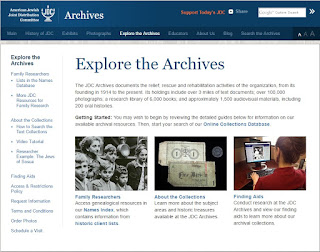CFA: 2017 American Jewish Joint Distribution Committee (JDC) Archives Fellowship Program
Lauren Turek
The American Jewish Joint Distribution Committee (JDC) Archives recently announced that it is accepting applications for its 2017 fellowship program, which may be of interest to those who study American Jewish history or American religious history more broadly. This year, the JDC Archives will award five or six fellowships to deserving scholars engaged in graduate level, post-doctoral, or independent study to conduct research in the JDC Archives, either in New York or Jerusalem. Research topics in the fields of twentieth century Jewish history, general history, and humanitarian assistance will be considered, as well as other areas of academic research covered in the JDC archival collections. The fellowship awards range from $2,500-$5,000.
The JDC Archives documents the relief, rescue and rehabilitation activities of the organization, from its inception in 1914 to the present. The repository houses one of the most significant collections in the world for the study of modern Jewish history. Comprising the organizational records of JDC, the overseas rescue, relief, and rehabilitation arm of the American Jewish community, the archives includes over 3 miles of text documents, 100,000 photographs, 1100 audio recordings, 1300 video recordings, 95 oral histories, and 157 recorded historic speeches and broadcasts.
According to their website there are multiple fellowship opportunities, including:
They provide the following details on how they will select the fellowships and what the fellowships include:
Candidates must submit applications by January 15, 2017, to the JDC Archives online. An Academic Advisory Committee consisting of leading scholars and members of the JDC Archives Committee will be responsible for selecting the fellows. Applicants must include an essay detailing the relevance of the JDC archival collection(s) to their proposed research, and if possible, indicate specific material(s) to be consulted, such as documents, photographs and audiovisual materials.
Stipends may be used towards travel, transportation, and living expenses.
Funds may not be used for family members.
Fellowship holders agree to deliver a presentation on their research activities upon conclusion of their fellowships.
Applications are due January 15, 2017.
For more information on the fellowships as well as the wonderful collections at the JDC Archives, you can visit the JDC Archives website here: http://archives.jdc.org/about-us/fellowships.html
As an aside, the JDC Archives also has a fantastic collection of digitized materials for research for those who cannot visit the archive in person, not to mention really well done online exhibits. I have found their resources on wartime and postwar relief and rescue particularly useful in my teaching as well as in my scholarship on twentieth century international relations. There is, of course, a wealth of information for scholars in other subfields as well.
The American Jewish Joint Distribution Committee (JDC) Archives recently announced that it is accepting applications for its 2017 fellowship program, which may be of interest to those who study American Jewish history or American religious history more broadly. This year, the JDC Archives will award five or six fellowships to deserving scholars engaged in graduate level, post-doctoral, or independent study to conduct research in the JDC Archives, either in New York or Jerusalem. Research topics in the fields of twentieth century Jewish history, general history, and humanitarian assistance will be considered, as well as other areas of academic research covered in the JDC archival collections. The fellowship awards range from $2,500-$5,000.
The JDC Archives documents the relief, rescue and rehabilitation activities of the organization, from its inception in 1914 to the present. The repository houses one of the most significant collections in the world for the study of modern Jewish history. Comprising the organizational records of JDC, the overseas rescue, relief, and rehabilitation arm of the American Jewish community, the archives includes over 3 miles of text documents, 100,000 photographs, 1100 audio recordings, 1300 video recordings, 95 oral histories, and 157 recorded historic speeches and broadcasts.
According to their website there are multiple fellowship opportunities, including:
- The Fred and Ellen Lewis JDC Archives Fellowship
- The Ruth and David Musher JDC Archives Fellowship
- The Sorrell and Lorraine Chesin JDC Archives Fellowship
- The Martin and Rhoda Safer JDC Archives Fellowship
They provide the following details on how they will select the fellowships and what the fellowships include:
Candidates must submit applications by January 15, 2017, to the JDC Archives online. An Academic Advisory Committee consisting of leading scholars and members of the JDC Archives Committee will be responsible for selecting the fellows. Applicants must include an essay detailing the relevance of the JDC archival collection(s) to their proposed research, and if possible, indicate specific material(s) to be consulted, such as documents, photographs and audiovisual materials.
Stipends may be used towards travel, transportation, and living expenses.
Funds may not be used for family members.
Fellowship holders agree to deliver a presentation on their research activities upon conclusion of their fellowships.
Applications are due January 15, 2017.
For more information on the fellowships as well as the wonderful collections at the JDC Archives, you can visit the JDC Archives website here: http://archives.jdc.org/about-us/fellowships.html
As an aside, the JDC Archives also has a fantastic collection of digitized materials for research for those who cannot visit the archive in person, not to mention really well done online exhibits. I have found their resources on wartime and postwar relief and rescue particularly useful in my teaching as well as in my scholarship on twentieth century international relations. There is, of course, a wealth of information for scholars in other subfields as well.


Comments